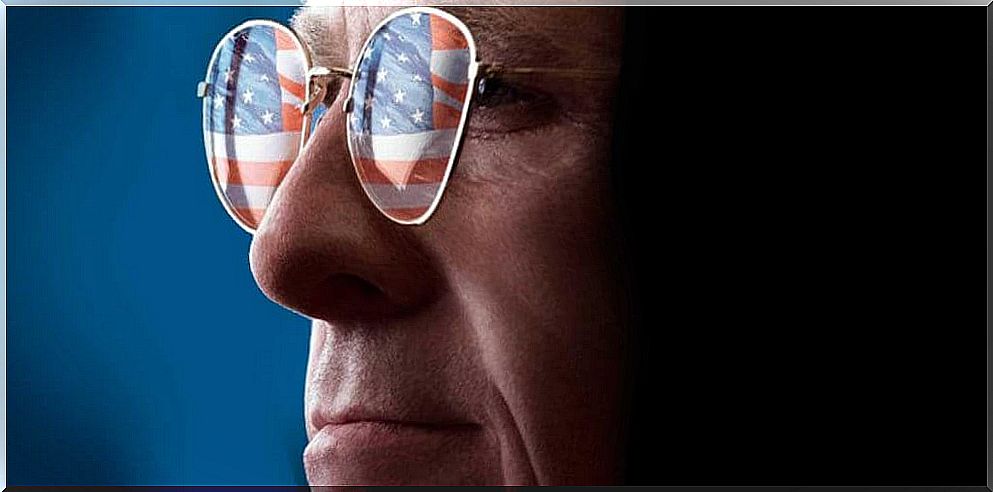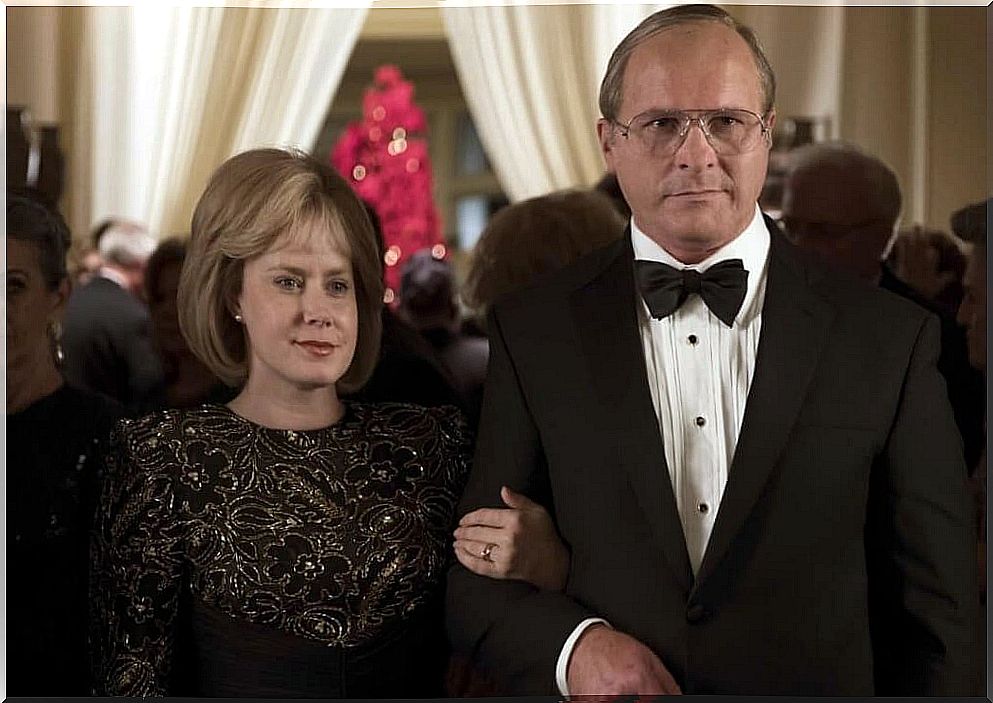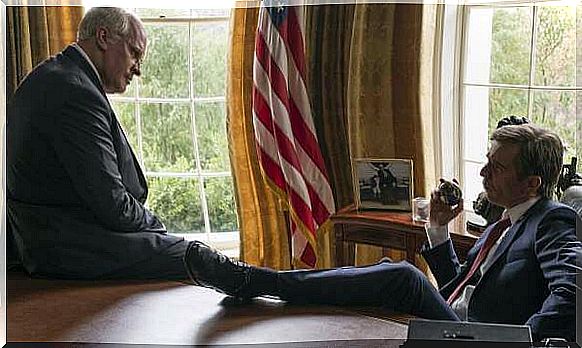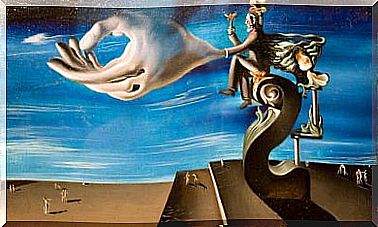The Vice Of Power: Dick Cheney’s Secrecy

Among the nominees for best picture was The Vice of Power , directed and written by Adam McKay and starring an unrecognizable Christian Bale. However, despite having eight nominations, she had to settle for the statuette for best makeup and hairstyling.
That she was not going to win the award for best film was an open secret, we also knew that the Academy was not going to award her excessively; even so, it is a movie worth watching and one of the best among the nominees.
If you have seen The Great Bet (McKay, 2015), you know what you are going to find: a film that oscillates between documentary and fiction loaded with acid criticism.
If you have not seen it, run to see it because it has no waste. McKay already made his intentions clear to us in 2015 with The Big Bet , a film in which he also trusted Bale and in which he blew up the housing bubble.
McKay seems determined to tell stories of manipulation, ins and outs and lies that are brewing from the top of the pyramid of power and remain hidden from the people.
On this occasion, what we have is a biopic, but not a tribute biopic, but a sarcastic one. The humorous, carefree and hooligan tone enlivens a totally dramatic plot. Dick Cheney was nothing more than a shy bureaucrat who went completely unnoticed, but he became vice president during the term of George W. Bush.
The vice of power disembowels this character, shows us how, from the shadows, he managed to manage all the threads of some of the most important events in our most recent history.
Politics does not exist, it is nothing more than a theater and we are being totally deceived, that is the feeling of hopelessness that The Vice of Power leaves us .
WARNING: Although the film is not fully revealed, the article may contain spoilers .
Discovering Dick Cheney
In the credits, the film is presented as a true story or, at least, that it is quite close to reality. The director warns us that it has not been easy to get into Cheney’s life, since he is an absolutely hermetic character ; with his casual tone he warns us: “we have worked like bastards.”
Dick Cheney was nobody, he was a young man who did not stand out in anything especially: he was not good at sports, he was expelled from university and spent hours getting drunk and using violence. After seeing the movie, the truth is that we almost prefer the drunk Dick than the politician; at least, when he was an alcoholic, his damage had no worldwide repercussions.
McKay does not mince words, he positions himself and is determined to show us a real monster and unscrupulous characters. Cheney’s wife, Lynne, will be in charge of enlisting Cheney in politics.
She, as a woman, has it quite difficult, despite her excellent grades and undoubted charisma. To quench her thirst for power, she will convince her husband to enter politics and, thus, almost without thinking, Cheney will approach the organs of power. “Behind a great man there is a great woman” this phrase, whose origin is something different and has been misinterpreted, is perfect for this situation.
He begins as a servant, as an invisible man in the midst of very powerful men. But he is cunning, silent and very observant, little by little, he will occupy more and more important positions. In the United States, the figure of the vice president is not really relevant, but rather a symbolic position; but Cheney would be the exception.
Cheney and his people began their rise with the help of the media and wealthy families in the country. Suddenly, renewable energies and the social policies that had been developed previously gave way to the paradise of the rich, of large companies and, ultimately, of power.
On stage, at the cry of “God bless America” countless solar panels are destroyed. Yes, we are looking at totally savage and brazen satire.
Cheney, the man whose target had always been Iraq, found his best chance after the 9/11 attacks. A named target with identifiable geography on the map, that was needed by society, and Cheney did not hesitate to point a finger at it. A liquid gold mine that the United States did not want to waste.
Without much charisma, but with unquestionable cunning and coolness, Cheney struck the table that would change the course of our current history. “The tribe has spoken” – they tell us – public opinion has been dominated and the people support the war: objective achieved.

The vice of power , a sour laugh
The digressions, the images, the comments of that spectacular narrator … The vice of power starts from the humor of the matter, but hides a very unpleasant truth. A laugh escapes us, but we also want to stretch our hair.
The narrator, whose identity is not revealed until the end, is shown as a working-class man, we see him at home with his family, at work and even in war. The low vs . power, satire makes even more sense from the figure of the narrator.
Individual executive power and the law of impartiality are terms that are repeated over and over again throughout the film. Cheney was clear about what he needed: absolute control and the law on his side.
On screen, a powerful slogan manifests itself at the top of the United States Supreme Court: “Equal Justice Under Law”; Meanwhile, Dick and his people are changing laws to get their way, irony?
How did the Cheney from the beginning get there? The viewer will try to understand how this man is now a fabulous dehumanized strategist who has become omnipresent. As in a game of Monopoly, Dick was made with countless dispatches, while Bush was nothing more than the visible face of everything that was behind.
In fact, the figure of George W. Bush is quite ridiculed. There is a scene, the best of the film in my opinion, that captures, through a simple gesture, the terror on both sides of the world: the terror of the powerful man exposed before the cameras, and the terror of the invisible man whose family is being bombarded by the mighty.
The satire is greatly reinforced in one of the film’s most epic moments: the false ending. The first half of the film has introduced us to Cheney and his rise to power. But he has been presented to us as a familiar and concerned man, capable of giving up everything for the good of his family.

On stage, an endearing American family happily enjoying their precious golden retrievers leads us to credit titles that end abruptly. No, the movie does not end here, did we think we were going to see a happy ending? Not at all, the best – or worst – is yet to come. From here, the pace increases and we plunge down a terrible abyss that continues to this day.
We ignore what we have in front of us, the media manipulate us, politicians play with us and our future looks very black. So we leave the cinema, desperate and in a state that goes from the tragic to the absurd. Who are the culprits of all this?
We could point to the protagonist of the biopic, but he prefers to point in another direction: us. And it is that, in the end, who gives us the lesson is the monster that we have been hating throughout the film.
The vice of power is the portrait – or caricature – of a terrible man, but extremely intelligent. It is an absolutely necessary film, with a style that is deeply reminiscent of documentary films like Michael Moore’s Fahrenheit 9/11 .
Dissect the whole plot behind the Iraq War, the addiction to power and the big lies that governments have told us. Are wars fair? No, absolutely not; however, they try to justify them, sell them through the media so that we all point to a common enemy.
In silence and very slowly, almost unnoticed, Dick Cheney reached the top and, from there, controlled everything. The vice of power , from sarcasm, appeals to reflection and reminds us that people should always be a priority, although some seem to have forgotten it. Like a slap, it hurts us, but at the same time, it wakes us up from our lethargy.









